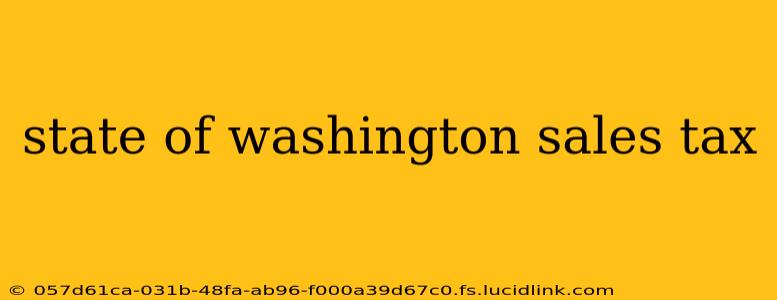Washington State is one of five states without a statewide sales tax. This means there's no general sales tax added to most purchases at the point of sale. However, the absence of a statewide tax doesn't mean there are no sales taxes at all in Washington. This guide will clarify the complexities of Washington's sales tax system, addressing common questions and concerns.
What is the Sales Tax Rate in Washington State?
The simple answer is: zero for most purchases. There is no state-level sales tax. However, this doesn't mean that you never pay sales tax in Washington. Several cities and counties impose their own local sales taxes, resulting in varying rates across the state. These local taxes can range from a minimal amount to several percentage points.
What Cities and Counties in Washington Have Local Sales Taxes?
Determining the precise local sales tax rate requires knowing the specific city and county where the purchase is made. Many jurisdictions levy their own taxes, and these rates are not uniform across the state. To find the exact local sales tax rate for a specific location, you'll need to consult the relevant county or city government's website. The Washington State Department of Revenue website also provides resources to help determine local sales tax rates based on address.
Are There Any Exceptions to the No Statewide Sales Tax Rule?
While most purchases are exempt from a state sales tax, some specific items are subject to excise taxes. These are essentially taxes on specific goods and services, distinct from general sales tax. Examples include:
- Motor vehicle sales: Washington imposes a motor vehicle excise tax (MVET). This tax is calculated based on the vehicle's value.
- High-Occupancy Vehicle (HOV) sticker fees: These are not strictly sales taxes but are related to vehicle purchases and registration.
- Hotel and lodging taxes: Many jurisdictions charge taxes on hotel and lodging accommodations. These taxes often fund tourism-related initiatives.
How Do I Calculate the Sales Tax on My Purchases in Washington?
The calculation of sales tax in Washington depends entirely on the location of the purchase. If you are buying something in a jurisdiction with a local sales tax, the seller will calculate and collect the tax at the time of the purchase. If there is no local sales tax in effect where you are buying, you will not pay a sales tax. It is important to be aware of the specific tax rate in the location of purchase.
What Types of Goods or Services are Exempt from Local Sales Taxes in Washington?
While the absence of a state sales tax is a general rule, specific exemptions from even local sales taxes often exist. These exemptions vary by jurisdiction and can include essential items like groceries or certain medical supplies. It's crucial to consult the specific local ordinances for a complete understanding of exemptions.
How Does Washington’s Sales Tax System Compare to Other States?
Compared to other states, Washington's system is unique due to its absence of a statewide sales tax. Many states have a combined state and local sales tax, leading to higher overall rates. Washington's system places more reliance on other revenue streams, such as property taxes, to fund public services.
Where Can I Find More Information About Washington State Sales Tax?
For the most up-to-date and accurate information on Washington State sales tax rates and regulations, always refer to the official Washington State Department of Revenue website. This is the primary source for all sales tax-related inquiries and provides detailed information specific to each city and county.
This comprehensive guide provides a general overview of Washington's sales tax system. Remember, the absence of a statewide tax doesn't mean no sales taxes exist. Always verify the applicable tax rate for your specific location before making a purchase.
